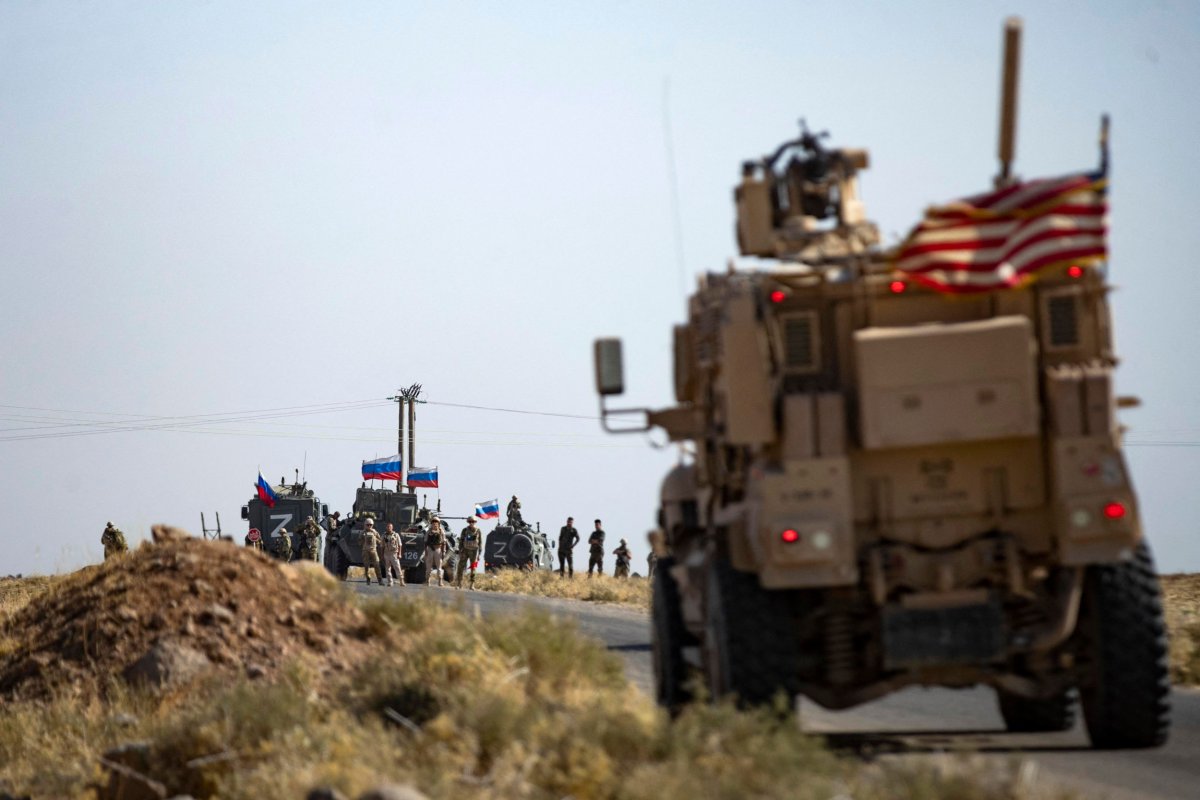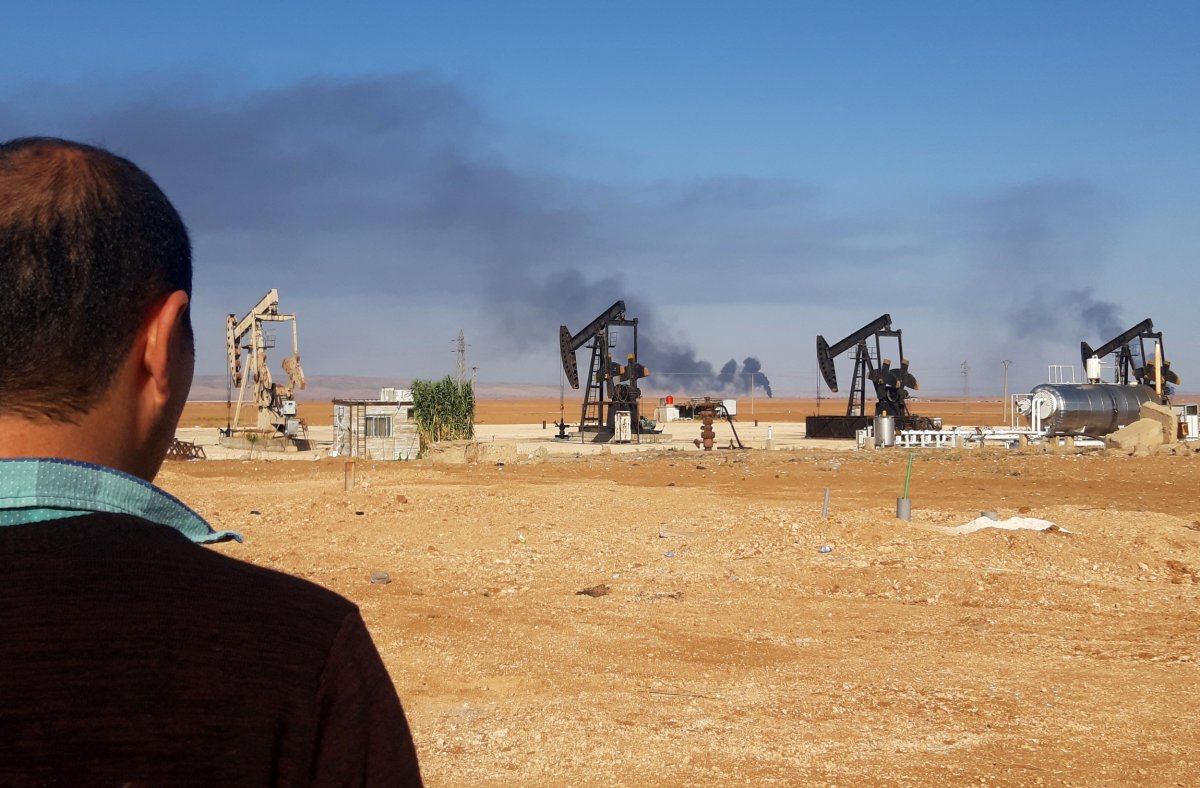The White House has warned that Russia was seeking to take advantage of divisions across northern Syria as the United States' NATO ally Turkey launched a new offensive against the Kurdish-led, Pentagon-backed Syrian Democratic Forces (SDF).
Answering Newsweek's question during a virtual press call Friday, National Security Council Strategic Communications Coordinator John Kirby said that it was "a concern of ours right now that Turkish operations in northern Syria could have an effect on the SDF" and "could affect our ability to stay partnered with them on a daily basis."
And though he said he did not think "there are larger concerns about strategic level cooperation with the SDF against a common threat, common enemy, and still a viable challenge in Syria, which is, of course, ISIS," he acknowledged it was likely that "the Russians will try to take advantage of whatever divisions they can for their own benefit."
While the U.S. supports the SDF in Syria's ongoing civil war, Russia has thrown its weight behind the country's government, led by President Bashar al-Assad. The Syrian leader has contended with nationwide unrest since 2011, contending against rebels and jihadis in a campaign in which the West has accused him of committing human rights violations.
"The Russians have been trying to capitalize on internal divisions from any number of actors inside and outside, in the neighborhood, to prop up the Assad regime to try to keep their toehold in the Middle East through Syria, and to continue to support Mr. Assad's war on his own people," Kirby added.

The divisions have been particularly pronounced in recent weeks as Turkey launched "Operation Claw-Sword," conducting hundreds of strikes against targets suspected of having ties to the Kurdistan Workers' Party (PKK) in northern Syria and Iraq. Targets included SDF positions as Ankara considered the group and its People's Protection Units (YPG) faction to be tied to the PKK.
The strikes came in response to a deadly November 13 suicide bombing in Istanbul that Turkish authorities have blamed on the PKK. The U.S., which also considers the PKK to be a terrorist organization, has declined to verify attribution for the bombing, while the SDF has rejected any ties to the attack.
The attack also prompted new warnings by Turkish President Recep Tayyip Erdogan of a potential fifth cross-border offensive against areas held by both the SDF and Syrian military.
Speaking to Newsweek earlier this week, officials at the Turkish Embassy in Washington, D.C., stated that "Operation Claw-Sword" has been "carried out in strict alignment with international law, notably Türkiye's right to self-defense under Article 51 of the U.N. Charter as well as the relevant resolutions of the U.N. Security Council on combatting terrorism."
"We are guided by the ultimate goal of ensuring the protection of the Turkish borders and striking at the root of terrorism," the officials added. "Terrorist shelters, hideouts, fortifications, their so-called HQs and training centers constituted legitimate targets in this regard. Thanks to this well-planned and executed operation, no civilians in the area lost their lives."
But, while Ankara accused Kurdish factions of targeting civilians, the SDF has argued that it was Turkey that did so, and that Ankara's actions were aiding ISIS by destabilizing the situation in northern Syria.
These concerns were expressed earlier this week by two senior SDF officials, Newroz Ahmed and General Mazloum Abdi, in back-to-back virtual briefings. Faced with the looming possibility of a new offensive by Turkish troops and Syrian rebel partners, both officials warned that the international community, including the U.S., was not doing enough to deter Turkey from following through with its warnings.
They also confirmed an SDF meeting with Russian military leadership in Syria at a time when Moscow has sought to establish an arrangement that would reconcile the SDF and Damascus, as well as normalize ties between Assad and Erdogan.

As the situation deteriorated, the SDF announced a suspension of cooperation with the U.S. and international coalition partners in the fight against ISIS. Reached for comment, Sinam Mohamad, representative of the SDF's political wing, the Syrian Democratic Council, in Washington, D.C., shared with Newsweek remarks by SDF General Command member Mahmoud Barkhdan, who said recent Turkish strikes forced the group "to stop operations against ISIS cells for several days."
"But today we started preparing a new schedule to start pursuing ISIS operations in coordination and participation with the coalition, starting tomorrow," Barkhdan said, with Mohammad confirming they were set to resume Saturday.
"As for Damascus," Mohamad said, "we don't have contact any with them so far."
The two sides have held multiple rounds of talks in an attempt to resolve their rival visions for governance in northern Syria, where a Kurdish-led administration is seeking to maintain a certain degree of autonomy from the central government. And the two sides have occasionally worked together against Turkey and the insurgents it supports.
Newsweek has reached out to the Syrian Mission to the United Nations in New York for comment.
Signals have emerged, however, in recent months of potential progress in resetting relations between Ankara and Damascus, which were severed as Turkey came out against the Syrian government in the early stages of the civil war.
On Friday, Kremlin spokesperson Dmitry Peskov said that "there is potentially such a possibility" that Assad and Erdogan could meet together in the Kremlin, marking what would be their first encounter since the conflict began.
Though Peskov said there were no details to speak of yet, he stated that, "of course, the Russian side is ready to facilitate this in every possible way."
Uncommon Knowledge
Newsweek is committed to challenging conventional wisdom and finding connections in the search for common ground.
Newsweek is committed to challenging conventional wisdom and finding connections in the search for common ground.
About the writer
Based in his hometown of Staten Island, New York City, Tom O'Connor is an award-winning Senior Writer of Foreign Policy ... Read more
To read how Newsweek uses AI as a newsroom tool, Click here.








